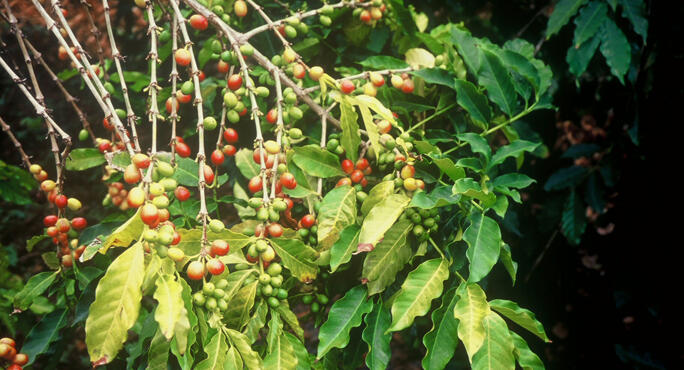Common Name
Botanical Name
AKA
“Coffee, the sober drink, the mighty nourishment of the brain, which unlike other spirits, heightens purity and lucidity; coffee, which clears the clouds of the imagination and their gloomy weight; which illumines the reality of things suddenly with the flash of truth...” - 1600’s description of coffee
Coffee, the Plant
The marvelous plant from which coffee derives is the coffee tree (Coffea arabica, canephora, liberica), an exquisite beauty of nature. Coffee makes up the genus Coffea of the family Rubiaceae. Arabian coffee is classified as Coffea arabica, robusta coffee as Coffea canephora, and Liberian coffee as Coffea liberica. According to botanical evidence, Coffea arabica originated in central Ethiopia.
Varying from 2 to 4 metres in height, the coffee tree is an evergreen possessed of long, slender branches covered with bright, waxy, spear-shaped leaves. The tree bears its fragrant white flowers and coffee cherries at the same time. Coffee flourishes at higher altitudes, requires both sun and shade, needs plenty of water, and must be rooted in porous, well drained soil. When all the conditions in which it thrives are met, the coffee tree responds by producing a profusion of elliptic green berries, which grow and ripen into bright red cherries half an inch long. Inside the bright red skin of the coffee cherry rests the simple coffee bean which bears the bracing stimulant caffeine.
“The intelligent man who empties these cups of foaming coffee, he alone knows truth.” -16th cent Arabic quote
A rich aromatic cup of coffee, brewed lovingly and drunk thoughtfully, delights the mind and banishes fatigue. It flings the eyes open, like a window thrown up to the sensual delights of a spring day. If you don’t care for coffee, then by all means don’t touch it. But if you enjoy coffee, then sip and savor without guilt or concern. For coffee is good for you, a gift from the gods, to relieve the fatigue of weary humanity. Coffee inspires.
Mighty Caffeine
The agent in coffee which imbues the bean with the power to march armies and mount massive commerce is caffeine, a humble alkaloid also known as
1,3,7 -trimethylxanthine. In green beans, arabica coffee contains 1.1% caffeine by weight, burly robusta weighs in at a hefty 2.2%, and liberica tips the scales at 1.4%. These percentages will vary depending on growing conditions.
Whatever contains caffeine will be consumed widely. This is a maxim upon which you can hang your hat, assured that no philosophical or pseudo-scientific wind will blow it off. Why do we consume caffeine? Because we love and crave it, of course. And why do we love and crave caffeine? Because it makes us feel good, by stimulating valuable physical and mental functions.
First and foremost, caffeine stimulates the central nervous system. It is a cortical stimulant, thus mobilizing brain function. It stimulates the flow of blood in the brain, and increases secretion of the important neurotransmitter serotonin in the cerebellum and the cerebral cortex. Caffeine invigorates the mind. It enhances alertness, facilitates thought formation, and decreases fatigue. Caffeine inspires the weary, elevates the moderately depressed, and quickens the step of the tired.
As with virtually every other substance known, dosage is important with caffeine. Dosage determines whether you will have a good experience or a bad one. For while caffeine promotes beneficial activity in the body, too much caffeine can produce nervousness, irritability and insomnia. A recent meta-analysis of caffeine studies performed at the French National Institute of Health and Medical Research, concluded that at around 300 milligrams per day, caffeine improves mood, vigilance, alertness and an overall sense of well being. Caffeine appears to work on the dopaminergic pathway in the brain, thereby enhancing mood. For most caffeine tolerant adults, this dosage range produces positive effects. This translates into two or three average strength cups of coffee per day.
From Psyche Delicacies, by Chris Kilham


